The Chromebook Pixel (2015) Review
by Brandon Chester on March 16, 2015 8:00 AM EST- Posted in
- Laptops
- Chrome OS
- Chromebook
- Chromebook Pixel
CPU Performance
Chrome OS is extremely lightweight, which makes sense for an operating system that has to run on processors that range from Intel's Core i7 at the high end, to Intel Atom and ARM processors at the low end. Most devices running Chrome OS are closer to that lower end, and that coupled with the web application nature of Chrome OS doesn't make it a large target for benchmark developers. The situation is arguably even worse than mobile benchmarking since the only benchmarks a device can be tested in are web benchmarks, but we have to work with what we have. The new Chromebook Pixel is powered by Intel's Core i5-5200U processor, which is one of Intel's new Broadwell-U parts.
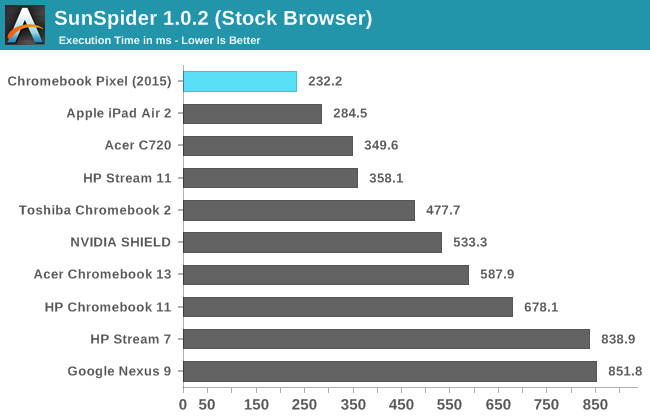
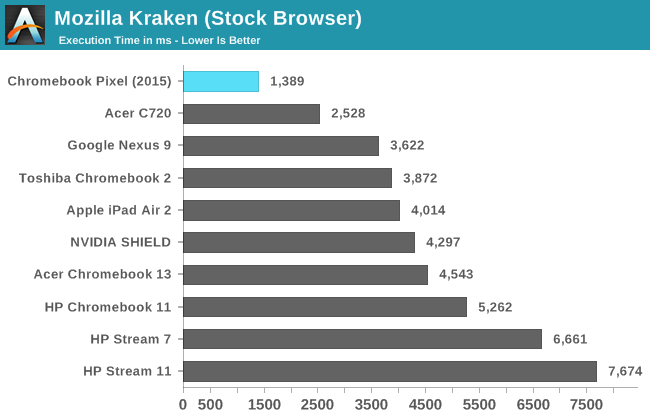
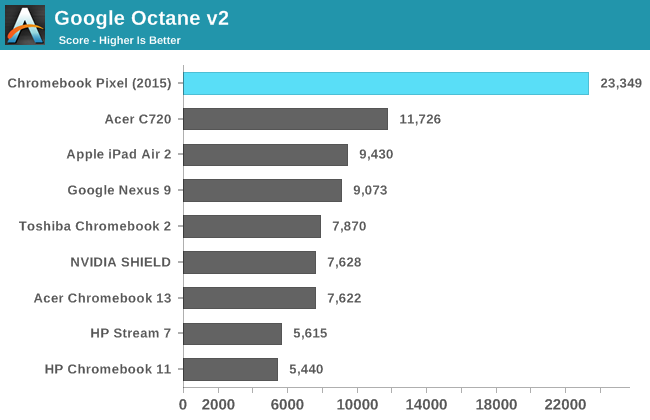
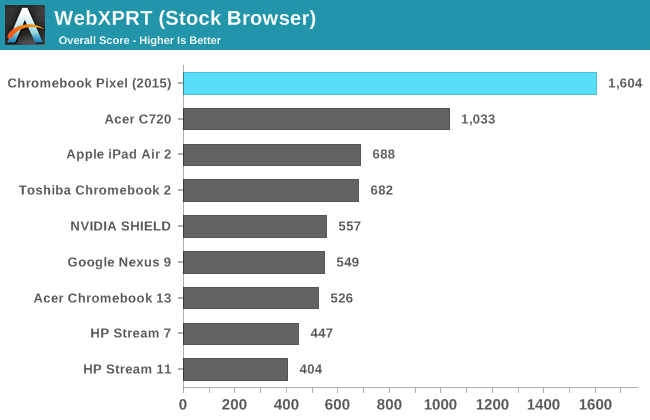
| Additional Performance Results | ||||
| Acer C720 | Acer CB13 | Toshiba Chromebook 2 | Chromebook Pixel (2015) | |
| CrXPRT | 96 | 55 | 61 | 161 |
| Spacerocks (WebGL - FPS) | 18 | 30 | 11 | 45 |
The CPU performance of the original Pixel could be described as completely overkill for running Chrome OS, and the same is true for this year's iteration. The Pixel gives you whats is undoubtedly the smoothest and fastest Google Chrome experience available. While I find the performance of an Intel i5 to be unnecessary to do something as simple as run Chrome and web apps, it definitely comes in handy if you're running some other version of Linux overtop of Chrome OS.
WiFi Performance
The 2013 Chromebook Pixel had dual spatial stream 802.11n WiFi and Bluetooth 3.0. In early 2013, this was fairly common among laptops, although 802.11ac adoption on high end laptops began not long after. The 2015 Chromebook Pixel uses Intel's Intel 7260 WiFi + BT 4.0 module, with 2x2 802.11ac support. This brings the max theoretical WiFi speed up to 866Mbps, a substantial improvement over the 300Mbps max on the 2013 model. Real world performance will almost always be lower than theoretical maximums, and to test WiFi performance I've used iPerf to get an idea of what the maximum throughput is on the Pixel.
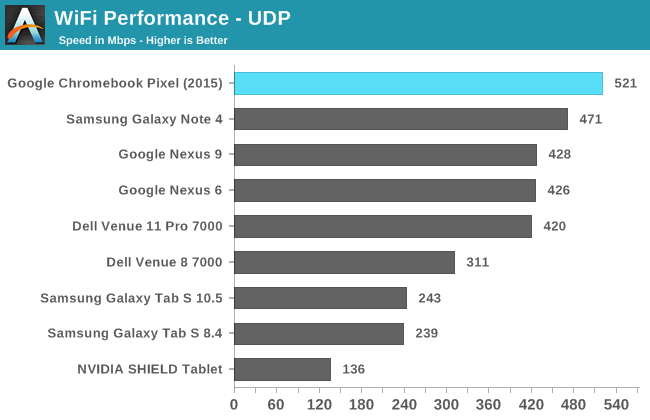
In most of our tests I've compared the Pixel to other Chromebooks, tablets, and smartphones. This is mostly due to the previously mentioned benchmarking limitations on Chrome OS. To keep consistent with this, and to avoid making unfair comparisons to laptops which aren't tested using iPerf, I've just run the Pixel through our smartphone/tablet WiFi benchmark. This still gives an idea of how fast the Pixel is, without comparing it to other laptops that were not tested in the exact same manner.










123 Comments
View All Comments
jimbo2779 - Tuesday, March 17, 2015 - link
You cannot ski 24/7, also kids tend to enjoy watching things they like while their parents sit around and have a relaxing drink.Face it 32GB is a tiny amount, especially when you are splashing this much cash for a laptop, it is absolutely inexcusable. There are so many scenarios where you would want some media on the machine and you would easily fill this up. Having to lug around extra USB drives to ensure you have enough storage when away from a net connection is just not as convenient.
Relying on cloud or NAS for your media is fine if you never leave your home or office but when you are out and about you need LTE for full coverage and not only does this cost more you are not always covered when not in a city and coverage can be spotty when you do have it.
On top of this there is the argument of relying on cloud storage which is great until they start charging for it after a few years so something that could have been added in the high price of your laptop is now costing real money.
Again, 32Gb at this price point is inexcusable, there are many reasons as to why.
armwood - Sunday, September 20, 2015 - link
It seems that so many people do not understand the concept of the Chrome operating system. It is a cloud system. Wifi is most places and where it is not either carry a hotspot or tether your phone. It is not rocket science. Google Drive or Dropbox can whole all of your data with movies etc on an SD card. Wake up, this is the future of computing. It amazes me how shortsighted so many people are.armwood - Sunday, September 20, 2015 - link
You need to spend a fee days with a Chromebook Pixel 2 LS. I use it and leave my Macbook Pro and Surface Pro 3 on my desk. I take it and use it for my college lectures over the other two machines. It is a superb, fast device that works in environments with weaker wifi signals better than Apple or Windows computers.jabber - Wednesday, March 18, 2015 - link
I've been using my Chrombook for over 2 years now. No user data has ever touched the 16GB SSD in it in all that time.I don't get the love for 'big data'. Just seems like tying yourself down to a huge anchor.
armwood - Sunday, September 20, 2015 - link
It seems that so many people do not understand the concept of the Chrome operating system. It is a cloud system. Wifi is most places and where it is not either carry a hotspot or tether your phone. It is not rocket science. Google Drive or Dropbox can whole all of your data with movies etc on an SD card. Wake up, this is the future of computing. It amazes me how shortsighted so many people are.psychobriggsy - Monday, March 16, 2015 - link
There's a lot to like about this product - especially the hardware and design.If it came with a 256GB SSD with Crouton pre-installed, that would have been great. 32/64GB isn't enough so you'd need to spend more on replacing this - a build option would be great. Yeah, I know this doesn't fit into Google's concept of a computing device.
The touchscreen is a bit pointless, unless they had made the device more Yoga-like, with a tablet folding mode.
In terms of hardware design, this is up there with the best. Other OEMs can learn a lot from this, for their non-Air-ripoff designs.
Hanoveur - Monday, March 16, 2015 - link
You can buy a 256gb XDSC card and plug that into it.jimbo2779 - Tuesday, March 17, 2015 - link
And spend more money fixing something that should not be an issue, sounds like a great solution.Also it is easy to lose a memory card, especially when kids are around. Built in storage is slightly harder to lose
steven75 - Wednesday, March 18, 2015 - link
Did you just bring up Flash player in 2015?djw39 - Monday, March 16, 2015 - link
But that "real computer" can be old and cheap. For example, I have a desktop PC I got 10 years ago for $500, anything the chromebook can't do due to limitations of the OS can theoretically be done on the desktop. In real life I almost never use the desktop.Now, I fully admit, I'd take an orange-and-white plastic version for $500-600. But I think a high-resolution screen and Core i5 sounds about right for the hardware.